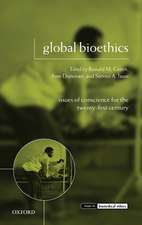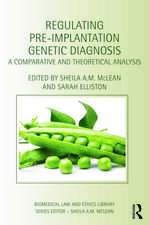Nanotechnology and Ethical Governance in the European Union and China: Towards a Global Approach for Science and Technology
Autor Sally Dalton-Brownen Limba Engleză Hardback – 24 iun 2015
The study explores the discourse ethics and participatory Technology Assessment (pTA) inspired by the work of Jürgen Habermas to argue that different views can be universally recognized and agreed upon, perhaps within an ideal global community of communication. The book offers a developed discourse model, utilizing virtue ethics as well as the work of Taylor, Beck, Korsgaard and others on identity formation, as a way forward in the context of global ethics. The author seeks to develop new vocabularies of comparison, to discover shared aspects of identity and to achieve, hopefully, an ‘intercultural personhood’ that may lead to a global ethics.
The book offers a useful guide for researchers on methods for advancing societal understanding of science and technology. The author addresses a broad audience, from philosophers, ethicists and scientists, to the interested general reader. For the layperson, one chapter surveys nanoissues as depicted in fiction and another offers a view of how an ordinary citizen can act as a global agent of change in ethics.
| Toate formatele și edițiile | Preț | Express |
|---|---|---|
| Paperback (1) | 575.56 lei 6-8 săpt. | |
| Springer International Publishing – 9 oct 2016 | 575.56 lei 6-8 săpt. | |
| Hardback (1) | 530.94 lei 6-8 săpt. | |
| Springer International Publishing – 24 iun 2015 | 530.94 lei 6-8 săpt. |
Preț: 530.94 lei
Preț vechi: 624.63 lei
-15% Nou
Puncte Express: 796
Preț estimativ în valută:
101.61€ • 105.95$ • 84.45£
101.61€ • 105.95$ • 84.45£
Carte tipărită la comandă
Livrare economică 20 martie-03 aprilie
Preluare comenzi: 021 569.72.76
Specificații
ISBN-13: 9783319182322
ISBN-10: 3319182323
Pagini: 227
Ilustrații: XII, 227 p.
Dimensiuni: 155 x 235 x 20 mm
Greutate: 0.51 kg
Ediția:2015
Editura: Springer International Publishing
Colecția Springer
Locul publicării:Cham, Switzerland
ISBN-10: 3319182323
Pagini: 227
Ilustrații: XII, 227 p.
Dimensiuni: 155 x 235 x 20 mm
Greutate: 0.51 kg
Ediția:2015
Editura: Springer International Publishing
Colecția Springer
Locul publicării:Cham, Switzerland
Public țintă
Upper undergraduateCuprins
Introductory context.- What is Nanotechnology and What Should We Be Worried About?.- Bioethics as an Approach to Nano ethics in China and the EU.- Nano regulation.- pTA (participatory Technology Assessment), Habermas’s Dialogue/Discourse Ethics and Nanofora.- The Virtuous Discourse Agent.- Universalism Versus Relativism.- Conclusion: Discourse Ethics and the Dialectics of East-West Intersubjectivity.
Notă biografică
Dr Sally Dalton-Brown is the Dean of Trinity College, The University of Melbourne. She has published widely on global literature and philosophy.
Textul de pe ultima copertă
This book addresses questions surrounding the feasibility of a global approach to ethical governance of science and technology. The emergence and rapid spread of nanotechnology offers a test case for how the world might act when confronted with a technology that could transform the global economy and provide solutions to issues such as pollution, while potentially creating new environmental and health risks. The author compares ethical issues identified by stakeholders in China and the EU about the rapid introduction of this potentially transformative technology – a fitting framework for an exploration of global agency.
The study explores the discourse ethics and participatory Technology Assessment (pTA) inspired by the work of Jürgen Habermas to argue that different views can be universally recognized and agreed upon, perhaps within an ideal global community of communication. The book offers a developed discourse model, utilizing virtue ethics as well as the work of Taylor, Beck, Korsgaard and others on identity formation, as a way forward in the context of global ethics. The author seeks to develop new vocabularies of comparison, to discover shared aspects of identity, and to achieve, hopefully, an ‘intercultural personhood’ that may lead to a global ethics.
The book offers a useful guide for researchers on methods for advancing societal understanding of science and technology. The author addresses a broad audience, from philosophers, ethicists and scientists, to the interested general reader. For the layperson, one chapter surveys nanoissues as depicted in fiction, and another offers a view of how an ordinary citizen can act as a global agent of change inethics.
The study explores the discourse ethics and participatory Technology Assessment (pTA) inspired by the work of Jürgen Habermas to argue that different views can be universally recognized and agreed upon, perhaps within an ideal global community of communication. The book offers a developed discourse model, utilizing virtue ethics as well as the work of Taylor, Beck, Korsgaard and others on identity formation, as a way forward in the context of global ethics. The author seeks to develop new vocabularies of comparison, to discover shared aspects of identity, and to achieve, hopefully, an ‘intercultural personhood’ that may lead to a global ethics.
The book offers a useful guide for researchers on methods for advancing societal understanding of science and technology. The author addresses a broad audience, from philosophers, ethicists and scientists, to the interested general reader. For the layperson, one chapter surveys nanoissues as depicted in fiction, and another offers a view of how an ordinary citizen can act as a global agent of change inethics.
Caracteristici
Pioneering attempt to ground global ethics in a specific context, that of nanotechnology Highly interdisciplinary integrative approach to ethics combining narrative ethics, policy, public discourse, sociology and identity and multicultural concepts Explains a comparative global view of a key technology - nanotechnology The combination of Habermasian ethics and pTA is a new approach There is very little currently on the market on Chinese debates on nanotechnology and nothing on pTA in China














